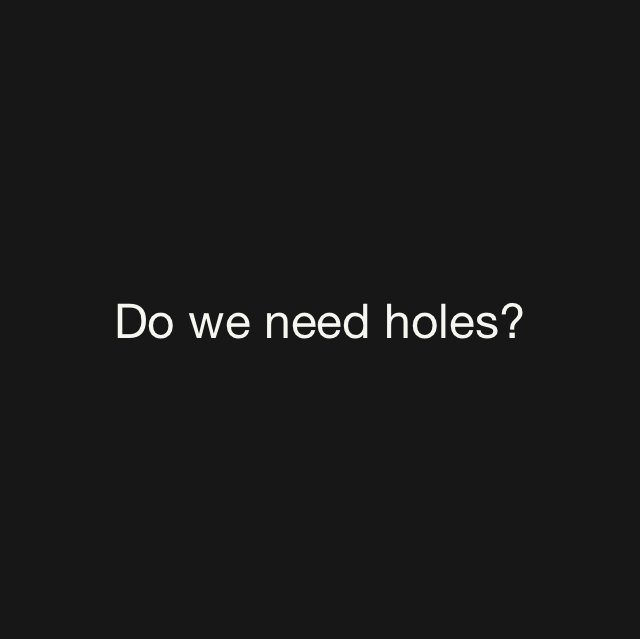
This is an oblique strategies card that I just pulled. It asks: “Do we need holes?”
I’m enjoying playing around with different ways of prompting writing and other creative work using tools like “oblique strategies” which is a lovely deck of cards created by Brian Eno. And I was thinking about it the other day when I was in a group and we were playing a game, a conversation game, where we were assigned to a random group of people in the room and then given a subject to talk about and also each of us was given a private role card, a card that described a role for us to play in this conversation, such as pedant or sceptic or enthusiast or summer-upper. And some roles were more abstract like “stomach”!
We were invited to play that role while talking about the question in front of us and the questions were made up things like “what’s the use of old people?” or “should we allow people to cross borders?” And it was really interesting because we were given that extra bit of structure and a bit of randomness, and an instruction to act a little out of the ordinary (unless you happen to be naturally a pedant or sceptical, or a stomach!) then it was really interesting to try playing a different role just for the fun of doing it. Some people in the group couldn’t find the fun in it they found it too difficult, I think that my advantage is that I trained as an actor and so I’m used to playing these impro games, but some people were uncomfortable with staying in role, they kept talking about whether they were in role and whether other people were in role or not, and some also found it really upsetting when people were behaving in a way that is not really socially acceptable in the sort of group that they thought they were in.
So this was a group of people talking about climate change people who are concerned about the situation the world find itself in and have a certain set of beliefs about what’s happening and what we should be doing and what kinds of conversations are acceptable. And we went to places that we wouldn’t normally go to,
And I think that’s really good practice for going out into the world and talking to people who don’t agree with us. It was a safe place to have a conversation with somebody who might completely disagree, but whom we know we’re safe with, as long as you can temporarily keep a distance between yourself and the roles that are been played. I think it also helps to see that some people have habitual roles that they play in groups like that, whenever they’re in a conversation, they almost always play, say the pedant, the sorts of people whose contributions are only to correct other people’s small mistakes.
Anyway, do we need holes?
One of the things I love about that deck of cards is that the questions hit you sideways. I sometimes physically feel the obliquity, tge feeling that you’re being hit by something that comes at an angle, you’re not expecting.
I shall certainly be thinking about my need for holes today.